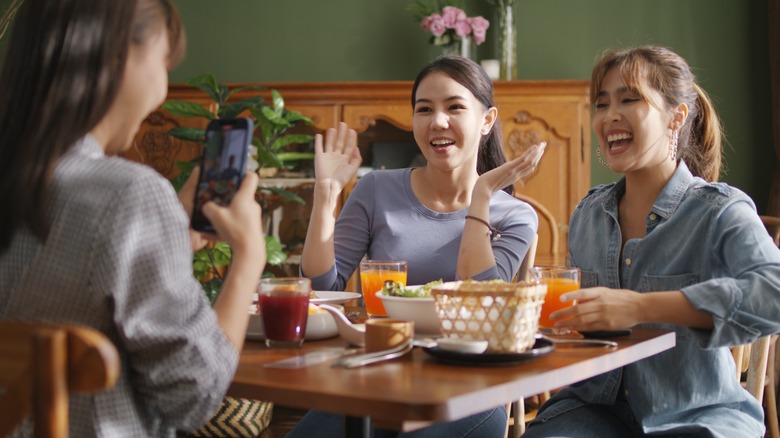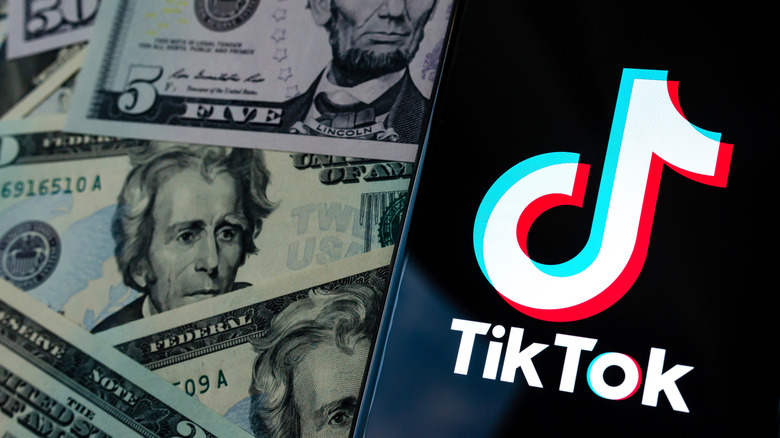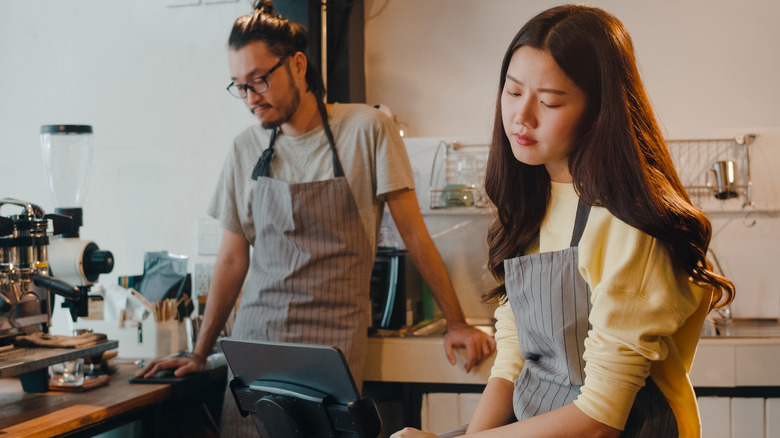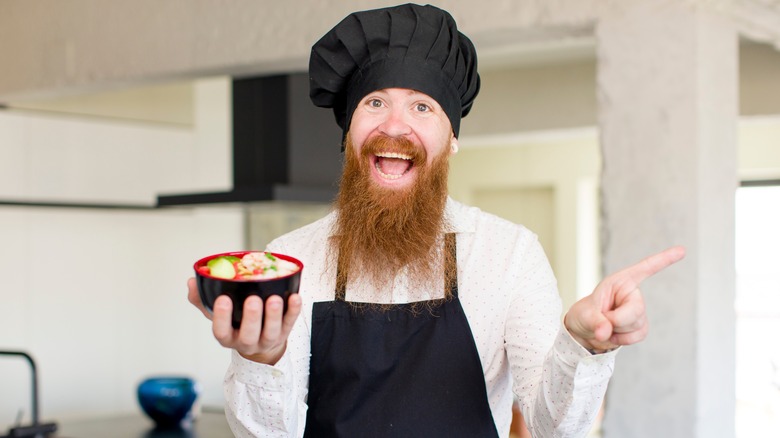Why Is TikTok So Toxic For The Restaurant Industry?
Once upon a time, opining about restaurants was left to a select group of lucky professionals who worked for print media and spent their days and nights dining out on the company's dime. These days, we're more reliant on social media to fill this role, which is okay in cases of crowd-sourced review sites such as Yelp and Trip Advisor. In recent years, however, social media influencers, particularly those on TikTok, are not just critiquing but actively trying to (and in many cases succeeding in) impact the restaurant experience.
While one pretty blatant example of this would be TikTok creators dreaming up wacky "secret menu" items and then expecting poor overworked minimum wage employees to memorize the complicated formulas, this pretty much only affects the fast food industry and here we're focusing more on fine dining. Still, TikTok trends are felt in this arena, as well, as is the case with an upscale NYC eatery that has a $28 gussied-up butter board on the menu. While the addition of a single menu item may seem harmless, it's emblematic of what we see as a disturbing trend: TikTok, it seems, may be getting dangerously close to dictating how we dine. Influencers seem to hold enough sway to determine not only what gets emphasized on the menu, but which restaurants thrive and which go under. What's more, they may not even be in it for the right reasons, instead wielding their social media influence to turn restaurants into hostages of virality and likes.
They may be doing it for clicks, freebies, or cold, hard cash
No matter the reason an influencer may give for why they chose to start a restaurant review channel, whether it be the love of food or the love of their fellow diners, the bottom line is always clicks. They are doing it to be seen, pure and simple, and no matter the subject matter, every TikTok influencer is really an entertainer. As such, they are driven by the need to find the most entertaining content to provide their audience, and entertaining very often equates with negative reviews. Alice Roosevelt Longworth is purported to have said, "If you haven't got anything nice to say about anybody, come sit next to me." This could well be many TikTok viewers' mantra, so influencers like TikTok's The VIP List are happy to supply the snark, calling restaurants out with lines like "the epitome of peasantry" or comparing the vibe to "bingo night at a retirement home."
While rave restaurant reviews do exist on TikTok, these are, if anything, even more sus, as there's always a chance that money may have changed hands. In fact, there are even agencies that exist for the purpose of connecting influences with businesses, charging hundreds if not thousands for what essentially amounts to the social media version of infomercials. At the very least, it seems as if many restaurant influencers expect to be comped for their pricey meals.
The threat of poor reviews may be holding restaurants hostage
As a recent survey reveals, TikTok plays a huge role in determining restaurant success. Over one-third of those surveyed by MGH admitted that they choose restaurants they see in videos and may also order the same dishes they see on camera. The downside is that TikTok can also give restaurants a good shove down the pathway to failure, as well, particularly if a negative review goes viral. One restaurant faced hundreds of bad reviews, many fake, due to an alleged incident regarding an employee's paycheck that had nothing to do with the quality of food or service. Even Gordon Ramsay caught TikTok flak over a restaurant kitchen that an influencer perceived as unsanitary.
It's no wonder, then, that many restaurants may tend to feel as if influencers are running a protection racket. Sadly, it's not unknown for an influencer to threaten to leave a bad review if their meals aren't comped and some do follow through on the threats. Unlike traditional media outlets, TikTok creators really aren't bound by too many enforceable codes of ethics, so the shady ones can essentially blackmail restaurants into providing freebies or even paying to avoid the threat of a bad review that stands a good chance of reaching a wide audience. While many, or even most, TikTok restaurant reviewers are unlikely to resort to such heavy-handed tactics, still, the fact that it is possible can promote distrust and fear on the part of restaurant owners.
TikTok demands style over substance
One more issue we have with restaurant TikTok is that it's created a demand for both presentation and menu items to be extra-showy. Food and beverage consultant Alex Delany tells Grub Street that restaurants such as NYC's Bad Roman actively try to promote a "viral dish," with the one at the time of writing being steak topped with a single super-sized, cacio e pepe-filled ravioli. While steak with cacio e pepe is a classic combo, the extra pasta from the ravioli sounds superfluous. Still, if this is something a chef created of their own volition because they enjoy playing with exploding pasta, well and good. If, on the other hand, it was designed under pressure to elicit TikTok endorsement, this presents problems.
The main point of food, after all (besides sustenance, which is important but unsexy) is to taste good, so chefs spend years training to perfect just-right ingredient combos and cooking techniques that maximize both flavor and texture. Demanding that they then add in some type of show-stopping visual element on top of that, strictly so each menu item will "perform," just doesn't sit well. Some of the most amazing dishes ever, like Chez Panisse's goat cheese salad or Cafe du Monde's beignets, might not have had a chance to shine if TikTok was around at the time of creation to demand they dance on the plate. As chef Ayal Shani laments of today's TikTok-driven demand: "It's very flat — it's not about going into depth."



